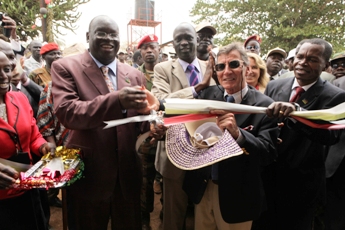Electricity project launched in Maridi, Western Equatoria
By Richard Ruati
February 23, 2011 (MARIDI) – US Consul General Ambassador Barrie Walkley and Western Equatoria state governor Bangasi Joseph Bakosoro on Wednesday February 23, 2011 visited Maridi to inaugurate a rural electrification project.

With a generation capacity of 880 kilowatts, the Maridi plant can serve about 900 customers and already has materials available to initially install 725 service connections. Approximately 21 km of primary and secondary lines have been completed to provide a backbone for future expansion.
Presiding over the event were Anthony Lino Makana, South Sudan’s minister of transport and Roads as well as the region’s energy and mines minister Garang Diing Akuong.
Also present on the occasion, Clement Konga, governor of Central Equatoria state and Louis Lobong Lajore governor of Eastern Equatoria and members of parliament at Government of South Sudan (GoSS) and state levels.
Makana lauded USAID for funding the project and two others in market towns in South Sudan. A plant in Yei was completed in March 2008, while the second one was inaugurated in Kapoeta on 4 February 2011.
Although limited trials were carried out in 2008 for street lighting in Maridi, today’s inauguration will see lighting expand not only along the streets but also to new households and institutional users.
Minister Makana said that “the current Maridi electricity which accommodates about 178 households will be expanded to reach every citizen of Maridi County.”
“With the electricity and dam project in WES, the GOSS will also initiate the tarmac of roads in the state,” said Makana.
The GoSS minister encouraged the women of Maridi County to move from charcoal stoves to electric stove which he said will make cooking faster for them.
Western Equatoria governor, Bakosoro said he was “delighted and thankful to USAID and its implementing partners Louis Berger Group and NRECA for a successful completion and inauguration – indeed the project will change the face of Maridi and the life style of Maridians.”
Energy and mines minister, Garang Diing Akuong, said he was honored to be at what he called “auspicious and historic occasion for the people of Maridi and southern Sudan to witness the inauguration of power supply to a small town.”
He added that “this is a culmination of collaborative efforts between the people of United States through their government and the people of southern Sudan through the Government of southern Sudan – these efforts have started to bring tangible benefits to the people of southern Sudan in all spheres of life and in particular the rebuilding of war ravaged infrastructure ranging from roads, bridges, water, and sanitation, and the electricity, since the signing of CPA following over 50 years of liberation struggle.”
Speaking at the inauguration project Ambassador Walkley said “First, let me say that I am delighted to be here. On behalf of President Barack Obama, the US Government, and the American people, I congratulate you on this historic event, which comes soon after the successful completion of the referendum.”
An estimated 3,000 people attended the landmark event.
In his concluding remarks Ambassador Walkley highlighted the importance of transparency and accountability in making the system a viable utility. “I have no doubt in my mind that members of the electric utility will expect managers of the utility to be fully accountable in their managerial roles.”
The electrification project in Maridi, a former garrison town for the Sudanese army in the civil war, began in 2009.
The Maridi Power Project Inauguration is a result of exhaustive work in the area of rural electrification undertaken by USAID.
Ambassador Walkley noted that “the success of projects such as this rests with the community and local government. The building of this power plant has been a highly collaborative process. Local community members provided much of the labor required to build this plant, and their hard work and dedication will be a permanent part of the electricity that flows throughout Maridi.”
It is believed that the project will play a significant role in improving the lives of the many families living in Maridi.
The project has already demonstrated additional benefits, in the increase of market activities.
Ambassador Walkley disclosed that “Potential major consumers of the power include Maridi’s local business community and residents, nongovernmental organizations (NGOs), small-scale businesses, and traders who operate along the town’s main streets and within the market. Other potential customers include institutions such as schools, medical facilities, and government offices – provision of electricity in Maridi will enhance security through street lighting, promote economic activity through more flexible hours of trade, and provide convenience to households, including for students studying after dark.”
USAID funding for the Maridi project, including training and project oversight by USAID implementing partners, will be approximately $3.9 million at completion in September 2011. USAID funding to southern Sudan’s energy sector overall since 2005 totals approximately $20 million.
The United States is the single largest donor to Sudan, contributing nearly $10 billion in assistance to Sudan and eastern Chad since the signing of the Comprehensive Peace Agreement in 2005.
(ST)

Peter Elia Kuzee
Electricity project launched in Maridi, Western Equatoria
Very good wark,we are moving ahead brothers,21 km line is completed,bravo western equatorians.
Deng Ateny Lueth
Electricity project launched in Maridi, Western Equatoria
No wonder, some parts of South sudan have already finished their roads and now they are erecting their electricity pools. i don’t know what purpose is Jonglei State serving.one think to note here, General Athor maybe responsible for insecurity in some parts of the state,but i don’t think he is responsible for rampaging corruptions that has now detained state developmental money. the issue is blamed on state athorities. i don’t think Athor has his millitans deployed and has control of Juba -Bor road, and why is it not paved yet, not even talk about tarmacing it.